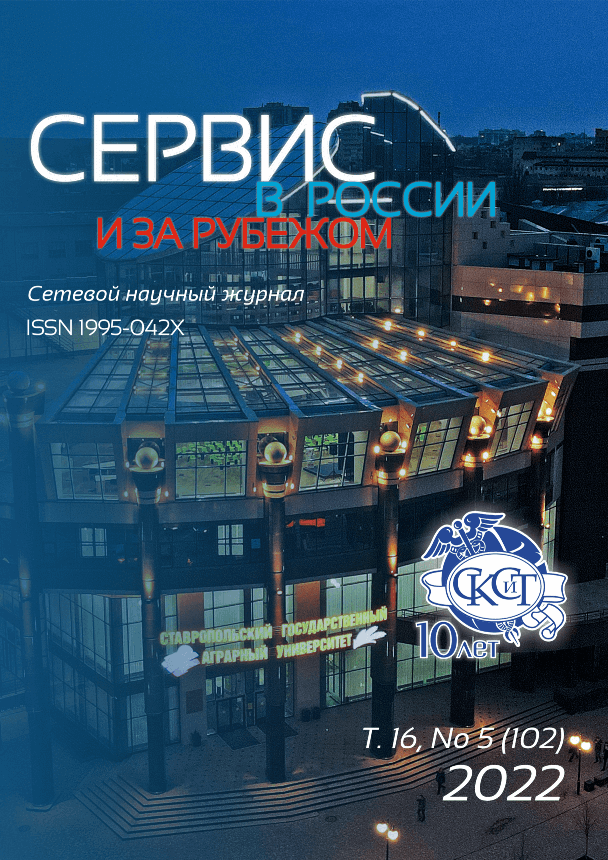Innovative aspects of designing learning outcomes to improve the professional training of specialists in tourism
DOI:
https://doi.org/10.5281/zenodo.7404368Keywords:
higher education, professional tourism education, tourism, planned learning outcomes, CDIO standards, graduate competencies, educational programsAbstract
The need for a meaningful transformation of the professional education of specialists in tourism is due to both the increasing demands of employers to the level of their training, and the intensive tourism industry development. The scientific novelty of the research is the development and methodological justification of the design of the planned learning outcomes based on the principles of "from the result" and "practice-oriented" by taking into account the interaction of a combination of three factors that determine the effectiveness of modern training in the field of tourism: 1. The Federal State Educational Standard of Higher Education (FGOS HE); 2. CDIO Syllabus (a system of content or a list of employers' requirements for vocational education in terms of attributes (competencies) and 3) the results of a survey of stakeholders on the list of significant competencies of a graduate of a tourist profile university and their priority. Description of the design of the planned learning outcomes it is made on the example of a separate direction of professional training at a university (43.03.02 "Tourism", profile "Tour operator and travel agent activity"). Considering this approach as one of the advanced methods of development, continuous improvement and evaluation of higher education programs, the authors propose a further algorithm for creating professional programs by determining the planned learning outcomes. Stavropol State Agrarian University has developed and is implementing 12 pilot programs in a similar way. The result of the design and qualitative updating of educational programs will be the formation of a complex of professional competencies of university graduates in demand for the tourism sector, allowing them to effectively perform professional tasks and function constructively in the conditions of innovative development of the tourism industry.
Downloads
References
Баева Л.В. Проектное обучение в современном вузе: опыт применения стандартов CDIO для подготовки студентов социогуманитарных направлений // Философское образование: Вестник ассоциации философских факультетов и отделений. 2014. №1. С.28-36.
Долженко Р.А. Концепция SDIO как основа инженерного образования: промежуточные итоги и направления дальнейшего использования в России // Известия Уральского гос. горного ун-та. 2017. №2(46). С.104-108.
Кондратьев Э.В., Чемезов И.С. Переход российского высшего образования на стандарты SDIO: содержание, перспективы, проблемы // Вестник Воронежского гос. ун-та. Сер.: Экономика и управление. 2015. №3. С.41- 50.
Мичурин С.Б., Мичурина Ф.З. Жизненный цикл туристского продукта и организация туристского сервиса: постановка проблемы // Географический вестник. 2017. №1. С. 124-129.
Никольская Е.Ю. Концептуальные вопросы туристского образования // Вестник Сочинского гос. ун-та туризма и курортного дела. 2010. №3(13). С. 82-85.
Пирогова О.В. Состояние подготовки кадров для сферы туризма в Российской Федерации // Интерактивная наука. 2018. №6(28). С. 24-28.
Спатарь-Козаченко Т.И., Морозан О.В., Петриенко Н.С. Актуальные проблемы профессиональной подготовки кадров в сфере туризма и гостеприимства в России и за рубежом // Сервис plus. 2018. №3. С.44-51.
Топоркова О.В. О содержании программ высшего технического образования: современные тенденции (обзор) // Высшее образование в России. 2020. Т.29. №3. С. 153-167. DOI: 10.31992/0869-3617-2020-29-3-153-167.
Bukalova G.V., Dorofeev A.N., Novikov A.N. Organizational capacity of cdio syllabus in actualization of the objectives of engineering education from regional perspective // IOP Conference Series: Materials Science and Engineering. 2020. Vol.786(1). Pp. 012078.
Buriachok V., Sokolov V. (2020). Implementation of Active Learning in the Master’s Program on Cybersecurity // Advances in Intelligent Systems and Computing. 2020. Vol.938. Pp. 610-624.
Chen W.-P., Lin Y.-X., Ren Z.-Y., Shen D. Exploration and practical research on teaching reforms of engineering practice center based on 3I-CDIO-OBE talent-training mode // Computer Applications in Engineering Education. 2020. Vol.8(2). Pp. 66-76.
Geraskin N.I., Krasnoborodko A.A., Glebov V.B. Network engineering education: Prospects for the implementation of the Worldwide CDIO Initiative in nuclear areas // Industry and Higher Education. 2020. Vol.20(2). Pp. 237-249.
Kohn Rådberg K., Lundqvist U., Malmqvist J., Hagvall Svensson O. From CDIO to challenge-based learning experiences–expanding student learning as well as societal impact? // European Journal of Engineering Education. 2020. Vol.45(1). Pp. 22-37.
Rouvrais S., Remaud B., Saveuse M. Work-based learning models in engineering curricula: insight from the French experience // European Journal of Engineering Education 2020. Vol.45(1). Pp. 89-102.
Tran N.H., Pham K.T., Bui H.V., Duong T.-T.T., Tran N.D. Students’ learning attitudes toward cdio-based business administration course design: An investigation from two universities in central Vietnam // International Journal of Psychosocial Rehabilitation. 2020. Vol.24(6). Pp. 9812-9822.
Vu T.L.A., Nguyen T.T.H. Applying change management theory in developing CDIO-based curriculum at universities in the Vietnamese ministry of transport // International Journal of Innovation, Creativity and Change. 2020. Iss.3. Pp. 584-604.
Yang C. Research on java programming course based on cdio and iterative engineering teaching pattern // Recent Advances in Computer Science and Communications. 2020. Vol.13(3). Pp. 519-530.
Downloads
Published
How to Cite
Issue
Section
License
Copyright (c) 2022 Tarasova, S. I., Taranova, E. V., & Dukhina, T. N.

This work is licensed under a Creative Commons Attribution-NonCommercial-ShareAlike 4.0 International License.












